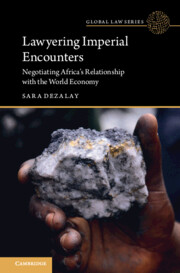Book contents
- Lawyering Imperial Encounters
- Global Law Series
- Lawyering Imperial Encounters
- Copyright page
- Contents
- Acknowledgements
- Abbreviations
- Introduction
- 1 Imperial Encounters
- 2 Indirect Rule and Middle Power
- 3 Gatekeeper States and Offshore Capitalism
- 4 The New Scramble, Deregulation, Re-regulation
- 5 Bujumbura
- 6 Abidjan
- 7 Paris
- 8 The Value of Social Class in Global Justice
- Conclusion
- References
- Index
2 - Indirect Rule and Middle Power
1880s–1950s
Published online by Cambridge University Press: 19 December 2024
- Lawyering Imperial Encounters
- Global Law Series
- Lawyering Imperial Encounters
- Copyright page
- Contents
- Acknowledgements
- Abbreviations
- Introduction
- 1 Imperial Encounters
- 2 Indirect Rule and Middle Power
- 3 Gatekeeper States and Offshore Capitalism
- 4 The New Scramble, Deregulation, Re-regulation
- 5 Bujumbura
- 6 Abidjan
- 7 Paris
- 8 The Value of Social Class in Global Justice
- Conclusion
- References
- Index
Summary
Chapter 2 argues that imperial powers (Britain, France and Belgium) deployed a similar strategy of legal imperialism during the nineteenth-century Scramble for Africa. Indirect rule operationalised the contradiction that colonial power was weak in its effective reach, yet strong in the systemic upheavals it engendered. It also fostered legal and capitalist unevenness, what Benton and Ford (2016) call ‘lumpiness’. The chapter focuses on three crisis situations that were ostensibly solved through juridical means: the 1920s Gold Coast conflicts before the Privy Council; the 1895 Stokes-Lothaire incident before the High Council of the Congo Free State; and pre-independence military trials in French and British colonies. Together, these judicial crises help account for structural commonalities in the articulation of post-independence African states with the world economy: the deployment of merchant law with and without state sovereignty and middling as a durable though variable sovereign resource of the post-colonial state.
Keywords
- Type
- Chapter
- Information
- Lawyering Imperial EncountersNegotiating Africa's Relationship with the World Economy, pp. 45 - 71Publisher: Cambridge University PressPrint publication year: 2025

